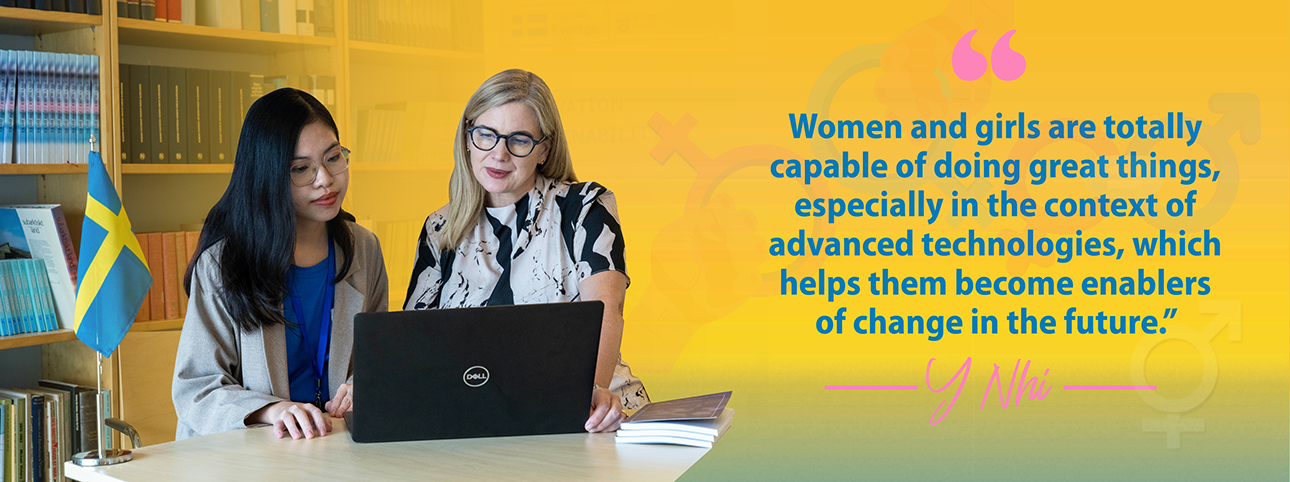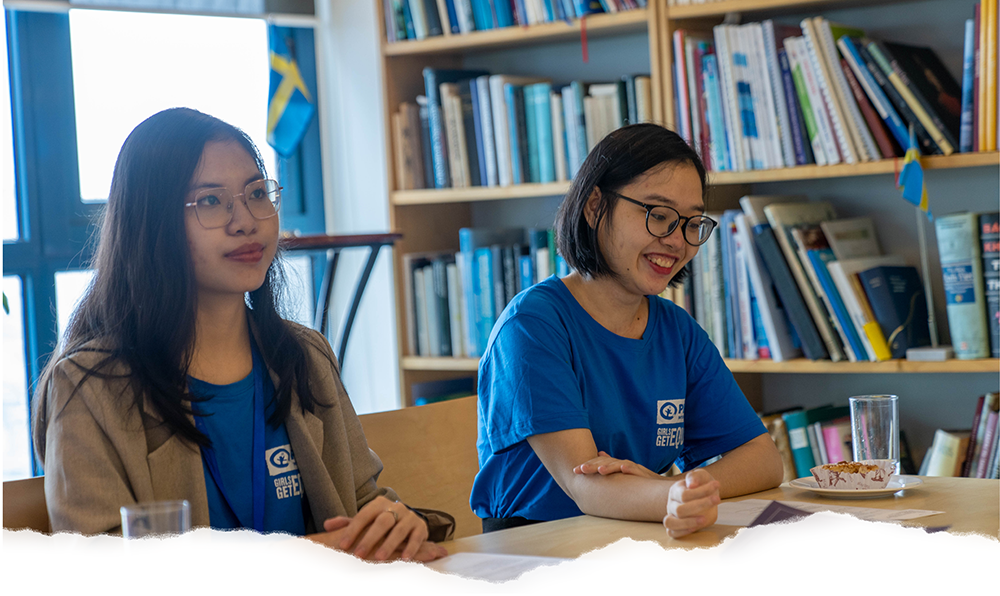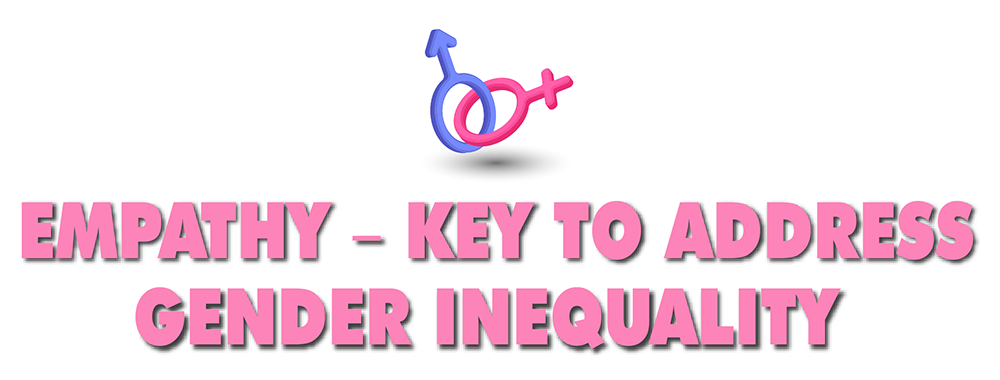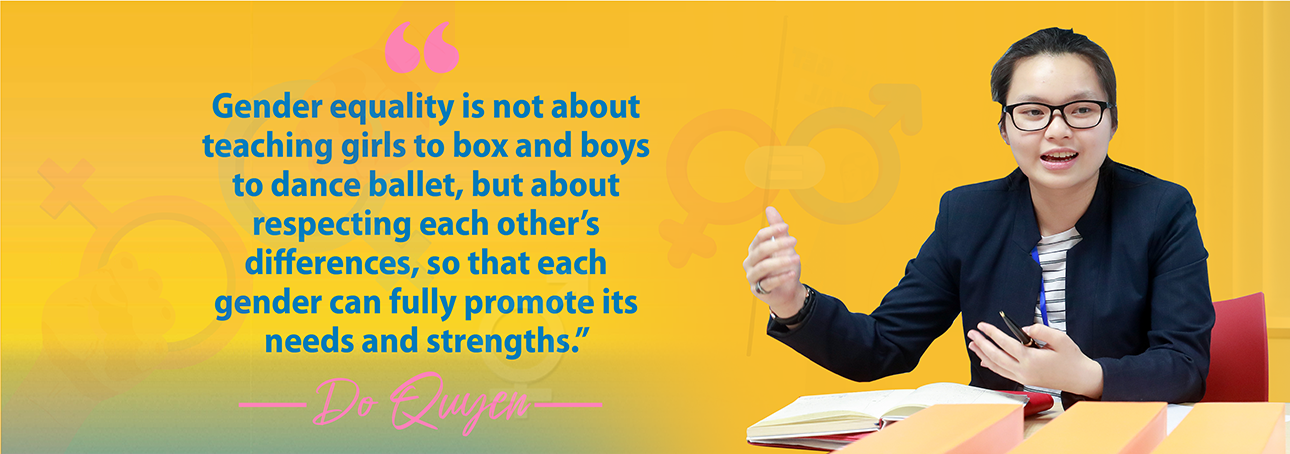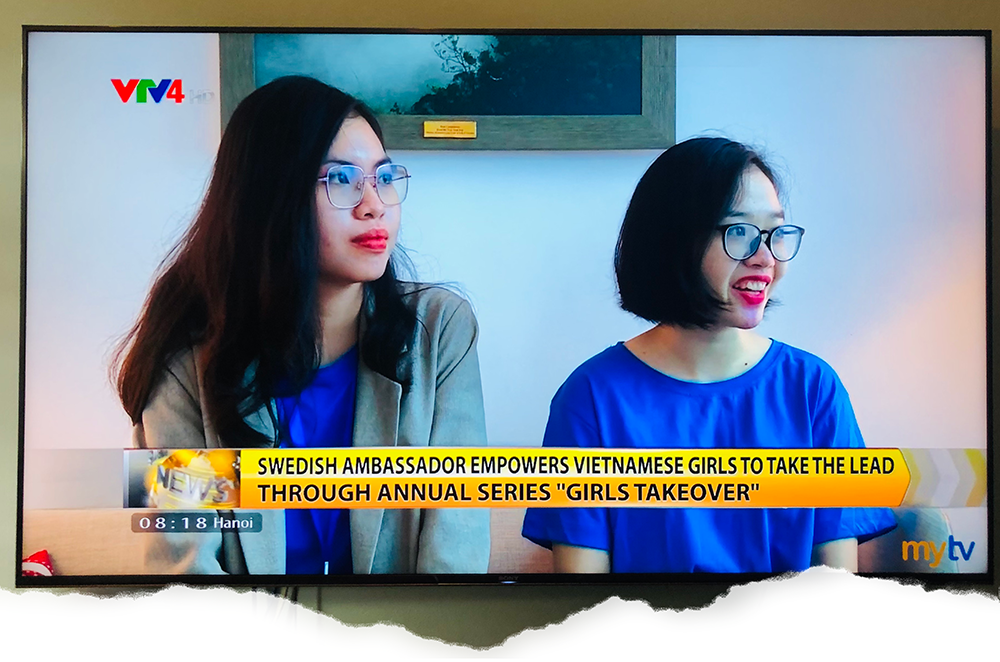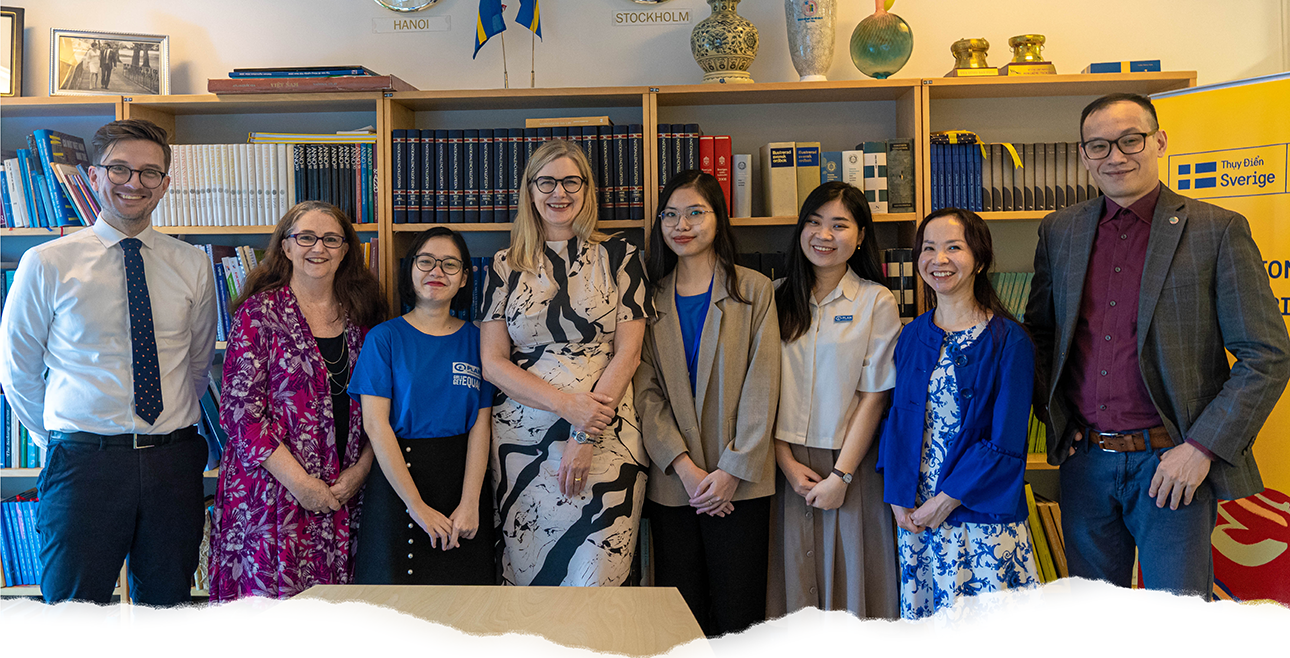Believing in yourself: Decisive factor for youths to advance gender equality
.
“I feel proud and confident when I’m trusted by a senior official and at that time, I know that I can do more,” a Vietnamese girl shared her feelings when she was supported by Plan International in a project promoting gender quality in Vietnam.
It’s been four years since Phuong Anh, 22, first joined the Plan International-supported Champion of Change project – a network of clubs in high schools and universities equipping knowledge of gender and leadership. She now stands up for gender equality thanks to her active engagement in community activities.
She never forgets her first impression of Plan International when she was a member of the gender equality network, the place where she was respected and listened to. Such a supportive experience enabled her to be selected to participate in a global agenda held in Belgium not long ago.
Phuong Anh said it was so wonderful when all opinions of her – a young and inexperienced girl – are recognized, making her very self-assured. “That is also the reason why I am always willing to volunteer and never turn down the opportunity to accompany young people in the common efforts against gender inequality,” she told The Hanoi Times.
The dedication has led her to another opportunity: to participate in the Swedish embassy’s “Girls Takeover” in Hanoi in 2019 and 2020. The Swedish ambassador empowered her to take the lead through the annual series which was launched in Vietnam in 2019.
Girls Takeover is a call to action for radical social and political change to tear down barriers of discrimination and prejudice that continue to hold girls back. Through the Girls Takeover on International Day of the Girl Child, girls occupy spaces where they are not often seen or heard, demonstrating that they are entitled to be there without being ignored or silenced.
She said the feeling of being trusted by a powerful person is so inspiring that she told herself to try her best as her efforts would partly contribute to gender equality in Vietnam.
Sharing the same view, Y Nhi said women and girls are totally capable of doing great things, especially in the context of advanced technologies, which helps them become enablers of change in the future.
“If you have the right motivation and orientation, you'll have more self-confidence and discover the best course for you,” Nhi shared with The Hanoi Times.
“For a better future that each of us setting hopes for, we are dedicated to it with utmost efforts for ourselves and others,” she said when taking part in the promotion of women and girls’ rights in Vietnam with the support of international organizations, including Plan International and the Embassy of Sweden.
For this reason, she hoped that women and girls in Vietnam and around the globe would be confident to join Industry 4.0 and take on leadership role as expected by Plan International Vietnam Country Director Sharon Kane.
Confidence and dedication have been factors enabling Phuong Anh and Y Nhi to back for gender equality by at least understanding the issues then helping raise awareness among young people and encouraging youth to engage in community activities.
The impacts of Covid-19 have widened education and digital gaps, resulting in countless challenges facing children, including girls. Limited access to the Internet and lack of electronic devices have concerned sexual equality advocates and inspired campaigners. Among those, Phuong Anh and Y Nhi are active contributors to the common drive.
Over the past few years, Phuong Anh has worked with young people from Plan International in Australia on a global report titled “A better normal: Girls call for a revolutionary reset”. According to her, Covid 19 is also a chance for girls to raise their voices over unprecedented challenges and a more equal future.
Phuong Anh's tireless work for the community has earned her the opportunity to present at the United Nations General Assembly where she also heard the voices and aspirations of women and girls all over the world. She remarked that receiving recognition from such an outstanding organization is an amazing feeling that she will never forget.
Phuong Anh has also been a member of Plan International Advisory Committee since its inception in 2019, providing support to young people across Vietnam on issues of gender equality and empowerment issues.
In the wake of the Covid-19 pandemic, the Plan International Advisory Committee has actively campaigned for safe cyberspace with Y Nhi being the representative. She joined others to guide children, especially girls on the Internet for a safe and effective learning environment.
In cyberspace, Y Nhi has participated in a series of activities including many of Plan International’s global campaigns on preventing fake news and promoting digital literacy for children. At the same time, she worked with her peers in Australia, Indonesia, and Vietnam to produce a report calling on young people to be more responsible online.
Speaking about the global “Online Future” research, Y Nhi said it’s the space where girls can use social media in a safer and healthier way than they do today. They can freely express their views and thoughts on social networks without being judged and stigmatized by others.
In addition, they can also use social media as a source of information for themselves. But the information needs to be highly reliable so that children can avoid reading false information, which can lead to unpredictable consequences.
On this occasion, Y Nhi shared her experience of being an ambassador for a day at the Swedish Embassy in Hanoi. At the post, she has to monitor a wide range of political, economic, and cultural issues. Notably, she took this chance to express her concerns about gender equality, including a safe online future for girls, digital education for girls, and the lack of social activities that connect people, mainly among groups of the same age, level, and interest.
“Beyond the issues, I want to convey the message to the girls: Be confident in yourself and be whoever you want to be,” Y Nhi noted.
A Vietnamese gender equality supporter believes that people of either sex can do the best for their partners and the community by putting themselves in each other’s shoes.
It means that issues related to sexual inequality will only be fully addressed when empathy emerges among those involved.
That’s what Do Quyen – a female Vietnamese student – has been thinking for years and she is now advocating gender equality through dynamic engagement in community activities for young people.
Such a view remained strong when Quyen shared it with me though it had been in her mind since she was a child. It became stronger when she was chosen to be the Ambassador of the Norwegian Embassy in Hanoi for one day. As a leader in charge of different fields related to politics, economy, culture, and tourism, Quyen was aware that a female ambassador is capable of taking the lead as long as she’s qualified and confident enough.
Regarding empathizing, Quyen stressed the importance of understanding and sympathy, saying that such expressions help to thoroughly address gender inequality.
In her sharing with The Hanoi Times, she believes that empathizing is essential in ironing out gender inequality not only in Vietnam but the world at large.
Giving an example of gender inequality, Quyen said the figures do not reflect the situation of women and girls in job opportunities and access to services. Women account for 48.4% of Vietnam’s labor force and 73% of Vietnamese women of working age join the labor force. These rates are higher than the world’s average, but gender equality remains a thorny issue in Vietnam, she noted.
The data failed to reveal social prejudices and views that prevent women and men from reaching their full potential, Quyen said.
Women entrepreneurs, for instance, are not given the same opportunities as their male counterparts out of concern that they’ll one day be spending time with their family instead of doing business. Meanwhile, male employees are criticized for refusing to host visitors in the evening even though these events are bad for their mental health. “Simply examining the data won’t be enough to address these issues. Instead of relying on rankings, policies must show empathy for all parties involved,” Quyen noted.
“The aforementioned problems only serve to highlight how challenging it is to comprehend others when you are not in their shoes,” Quyen said, adding that to better address gender equality, policies should be in place to promote gender equality, but empathy should be given special attention.
At schools, gender inequality is more serious than in other places as the young people concerned are forming their personalities, attitudes, and developing worldviews.
According to Quyen, if a child is repeatedly told that boys should pursue science, technology, engineering, and mathematics (STEM) and they are regarded as effeminate if they follow literature, such harmful practices will lead to gender stereotypes.
Citing another example, Quyen said literary works assume that men are strong and must suppress their pain while women should be enduring. But it’s necessary to give young people more space to adapt to changes and learn their own lessons instead of praising the characters that are passed on for centuries.
Gender inequality is not a new problem but getting people to talk about it and come up with new approaches has only been done recently. For many people, it is a sensitive issue that they avoid talking about. Quyen believes it’s never too early to talk about gender because even a preschool baby also has his/her own gender awareness.
To put gender equality on the correct track, viewpoints, and teachings on it need to be debated and studied in a setting where the majority are also open to new ideas and attentive to them. It takes a long time to change and correct deeply ingrained prejudices in a person’s mind.
Together with encouraging students to speak out and take action in favor of gender equality, schools must place a high priority on teaching students how to put themselves in others’ shoes in order to respect and understand them.
According to scientists, gender differences are more pronounced in economically developed nations and regions with higher gender equality indices.
In this sense, Quyen is naturally aware of gender issues through her daily observations. Since preschool, she has been reflecting on how people are often surprised and perplexed by her preference for sports such as baseball, soccer, and other power sports.
The repeated assumptions disheartened girls like her and destroyed their hope sometimes.
“Ever since I’ve been driven by a burning desire for people to gradually open up and be more accepting of my different viewpoints,” she shared.
The gender stereotypes prevalent in some eras may be accurate, but as society evolves, new concepts and viewpoints must be openly discussed in order to arrive at the best course of action. The most crucial element in this transition is youth.
For her part, Quyen has written down a slogan: “No her story, no history” to stress the important role of women, which is sometimes forgotten.
“As part of the young Vietnamese generation, I feel I have a responsibility in this regard and am trying to motivate youth groups to get involved,” Quyen stated.
To that end, she worked with people who advocate for gender equality, most notably playing the Norwegian Ambassador to Vietnam for a day and attending a meeting held by the UN Population Fund (UNFPA).
Statistics provided by UNFPA on gender inequality including sex-selective abortions and gender-based violence in Vietnam have surprised others, including her friends abroad. The fact that nearly 46,000 female births are lost in Vietnam every year might be caused by gender-biased sex selection and sex stereotypes passed down orally from generation to generation.
In an effort to contribute to promoting gender equality in Vietnam, Quyen has attended a number of conferences where she has shared her thoughts and discussions with international peers and experts to gain some lessons.
Quyen said she enriched her knowledge to approach gender equality in a more scientific manner to better communicate gender-related issues. In addition, she has joined gender equality campaigns such as encouraging girls to pursue science, technology, engineering, and mathematics (STEM), holding talk shows with experts, and donating electronic devices to pupils in remote areas, among others.
“Gender equality is not about teaching girls to box and boys to dance ballet, but about respecting each other’s differences, so that each gender can fully promote its needs and strengths,” Quyen stressed.
In a broader sense, Quyen believed that women could sometimes achieve much more than they currently do. For that reason, improving their circumstances also contributes to the advancement of society.
Vietnam unlocks domestic demand to spur growth
Amidst global uncertainties, Vietnam is looking inward to its strongest foundation: a domestic market of 100 million people.
07 May, 12:14 PMFrom Mass Education Movement to Digital Literacy for All
The Digital Literacy for All movement is working to close the gap between those who are comfortable with digital tools and those who are not, ensuring that no one is left behind as society becomes more dependent on technology.
26 Mar, 05:35 PMUncover the hidden gem: Must-visit attractions in Quoc Oai District
Quoc Oai District, about 30 kilometers west of Hanoi's bustling center, is a great place for people to learn about the area's stunning nature, vibrant culture and fascinating history.
16 Dec, 06:07 PMSocial media: Means for cultural values dissemination by Hanoi youth
Social media in the digital age enables Hanoi's youth to share cultural values and strengthen their role in protecting and advancing the country's cherished traditions.
06 Dec, 03:28 PMHow are Vietnamese children affected by climate change?
When climate change spares no country or people from natural disasters, it becomes an absolute duty to protect human being, especially children.
22 Nov, 11:48 PMVietnam - Fertile ground for innovation
“It is about planting the seed, having the fertile ground to plant the seed, and making it grow.”
08 Oct, 11:01 PMYouth in Hanoi offers free meals to the needy
A group of high school students across Hanoi has been providing free meals to the elderly in nursing homes, hospitalized patients, and the needy for more than ten years.
29 Sep, 10:03 AMHanoi Tourism Gift Festival 2024: Marketing opportunity for traditional handicrafts
The event largely helps revive traditional national values, restore products almost forgotten, and speed up the quintessence of Hanoi and the nation.
01 Sep, 10:16 PM



